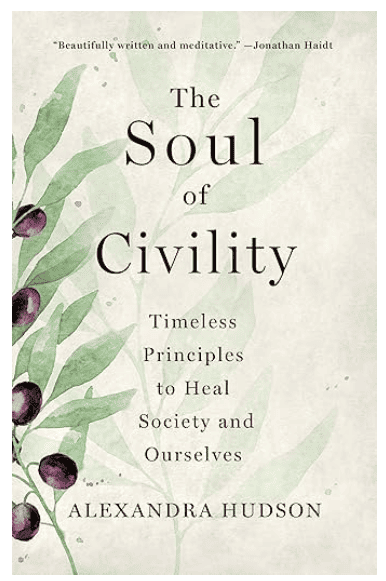By Jim Heffernan
I think I am probably a sucker for anything with the word civility in the title. This book by Alexandra Hudson, is no exception. I found her book edifying and utterly charming.
The book is divided into 3 parts with a total of 12 chapters. Each chapter is really a well-developed essay. Each chapter is “illuminated” by wide-ranging quotations going as far back as the Ptahotopep and the first book and as far forward as Martin Luther King and Bobby Kennedy. The quotations by themselves are like a short course in classical philosophy and morality.
In the first part of the book, she devotes two chapters to “The Timeless Problem” and “The Timeless Solution.” Between both, she explores the difference between civility and politeness. Both are admirable qualities, but civility carries more truth and is dependent on a sincere respect for others. She introduces a term, “libido domiandi”, which translates to “the desire to dominate.” To explain “The Timeless Problem” she reaches back to the 5th century and St. Augustine for the term. The term explains a lot about our need to rule and be right about everything.
I love that her “Timeless Solution” goes back 2,400 years to the oldest book, “The Lessons of Ptahotopep” and hinges around the advice, “Do not be proud and arrogant with your knowledge.” Civility, meaning true respect and regard for others, is the “Timeless Solution.”
The second part of the book and the next nine chapters deal with “Why Civility” and examines topics of integrity, democracy, human flourishing, equality, and citizenship. Each chapter deals in this part is only slightly linked to each other chapters.
The final part of the book is three chapters dedicated to being a guide to putting civility into practice.
Here’s an excerpt from the end of the book, some of it is her writing but there is also also a great William Blake Poem, “The Poison Tree” from 1794 that remains topical today.
We’ve relinquished our sense of meaning to transient, political issues. There are many serious and important topics that demand action. To be effective, we must reclaim civility, and the fundamental respect for others it commands, despite deep and profound differences. Civility requires respecting others by telling hard truths and engaging in robust debate. But we’ll be able to have reasoned, productive, and robust debates only if we enjoy activities outside of politics that nurture our interior lives and give us the inner strength to engage in the battle of ideas and public life with grace. We must reclaim pursuits and values—things such as curiosity, friendship, humor, and beauty—that bring us joy and give our lives meaning beyond politics. Our democracy, our freedom, and human flourishing depend on this.
Of course, this is easier said than done. There remain many open wounds from political battles in history, both recent and distant. How can they be healed? Even if a moment of healing and forgiveness occurs, what happens when grudges per- sist? William Blake tells us in his powerful poem “A Poison Tree” that wounds unattended to—needs unmet for too long—fester and grow. Bitterness is herbicide for the garden of civilization. It attacks and corrodes the root of our souls, depleting us and leaving us nothing to give others.
Bitterness metastasizes hearts and minds, and emotions surface in harmful ways that may surprise us. We need the fertilizer of forgiveness to nourish us, and to allow us to nourish others, and to sustain the joint project of cultivating the garden of civilization. In helping us reclaim a high view of humanity in both ourselves and others, civility equips us to have the candid, honest conversations that are necessary for healing. It’s the water that enables the fertilizer of forgiveness to help grow and nurture our souls. Civility gives us a way to constructively communicate.
“The Poison Tree”
I was angry with my friend;
I told my wrath, my wrath did end.
I was angry with my foe:
I told it not, my wrath did grow. And I watered it in fears,
Night and morning with my tears:
And I sunned it with smiles, And with soft deceitful wiles. And it grew both day and night. Till it bore an apple bright.
And my foe beheld it shine, And he knew that it was mine. And into my garden stole,
When the night had veiled the pole;
In the morning glad I see;
My foe outstretched beneath the tree.
—William Blake, nineteenth- century English poet and painter, “A Poison Tree” (1794)
In a big surprise, the book also contains a free gift. Just before the acknowledgements, there is an offer for two free months of Wondrium, (a streaming version of what once was called “The Great Courses” which contains Alexandra’s storytelling course. I love Wondrium as place to find academic courses on everything from beginning Algebra to Quantum Physics and I think everything in between. My favorites, include history, religion, and self-improvement.
As always, discussion and questions are welcome at codger817@gmail.com.


